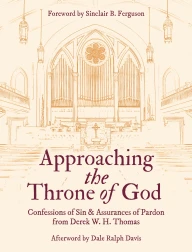Approaching the Throne of God
In March of 2025, Christian Focus are releasing my book, 'Approaching the Throne of God'. I had not intended for this to be published, but there’s a sweet story that explains its publication.

For some time in my closing years of ministry as the senior minister of First Presbyterian Church, Columbia, South Carolina, I began to write my own Confessions of sin. My British friends will need some explanation. Presbyterians in the USA, even conservative Presbyterians, print a bulletin for Sunday worship. It includes a call to worship, the Lord’s Prayer, the Apostles’ Creed, some hymns which are not to be found in the hymn book, a sermon text and title and a closing benediction. British folk, seeing this bulletin, might conclude that the service is very liturgical, perhaps having something of Anglican, 'Prayer Book' feel to it. But I venture to respond that if you were to write down all that is said and done in a typical worship service in the UK, some of these elements of worship will be there, even if only minimally present. Sinclair Ferguson has written about how, at the Reformation, liturgy was viewed as part of the application of Scripture:
“They (the Reformers) well understood that the rediscovery of the gospel and the reformation of worship were two sides of the same coin, because sung praise, confessions of sin and confessions Faith, prayer and the reading and preaching of Scripture are but various aspects of the one ministry of the Word. For that reason, the Reformers regarded the liturgies that framed the Church’s worship as being an important aspect of the application of Scripture. An order of service could not therefore be simply thrown together casually. It might belong to the adiaphora; but “things indifferent” are never treated with indifference to the general teaching of Scripture (as the Westminster Divines would later make clear).” (Foreword to Reformation Worship: Liturgies from the Past for the Present, Eds. Jonathan Gibson and Mark Earngey (Greensboro, NC: New Growth Press, 2018), xv-xvi.
For some time, I had employed a dozen or so set forms of a Confession of sin, drawing from liturgical documents of the Reformation and post-Reformation liturgies. But I was getting to the point where the sameness of these confessions had lost their power. And I decided to start writing my own Confessions of sin.
I looked at the text I was due to preach on that day and asked what is this text asking of me? And how am I failing to provide it? And wrote somewhere between 50-75 words.
There is something very counter-cultural to hear a large congregation read out loud words of confession. Sin is not in the consciousness of the natural man, and too little in the consciousness of believers. And just as Christians need help to understand the Bible, they also need guidance in how to pray, and more specifically, how to pray a confession of sin. Too often, Bible Studies drive home the Christian anthem: “O say can you see, what’s in it for me”! Too often, we fail to be broken by the holiness of God and his righteous demands.
A public confession of sin as part of Sunday morning worship is both humbling and honest. Together, as a corporate body of believers, we come reminding ourselves that the reason we love the gospel is because it answers the problem of our sinfulness. Hence the Confession of Sin is followed by the Assurance of Pardon. These were mostly passages of Scripture that draw attention to the fact that God forgives the repentant sinner. Occasionally, I drew from well-known hymns that spoke of assurance. These provided a teaching moment, especially if the hymn from which the assurance wads drawn was then sung.
The apostle John wrote, “If we confess our sins, he is faithful and just to forgive us our sins and to cleanse us from all unrighteousness” (1 John 1:9). John evidently means that confessing sins is not a once and for all event. We must daily confess or sin to God.
The fact that these are being published was a complete surprise to me. As one of many farewell gifts at the time of my retirement, the church decided to have them published. A bevy of industrious people have been involved and I have only recently seen the draft manuscript. I am pleased that something I did might have a greater influence than what I at first intended. These Confessions of sin can also be used on a personal level, in our daily devotions, for example.
My prayer for this book is that it might help you worship better, for that would a very good thing.



